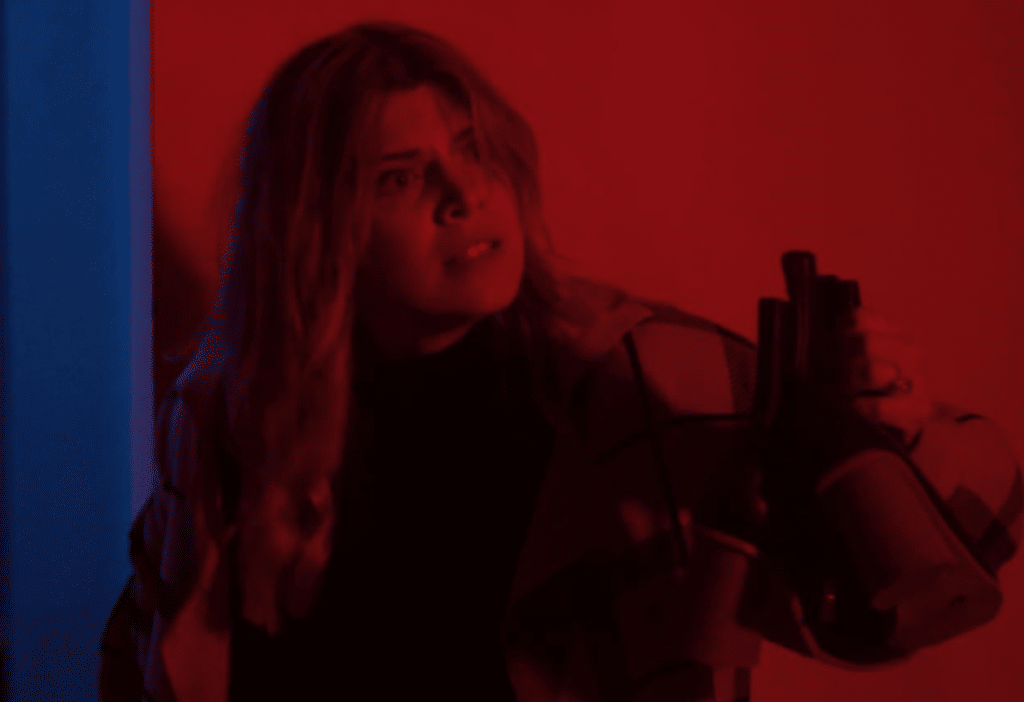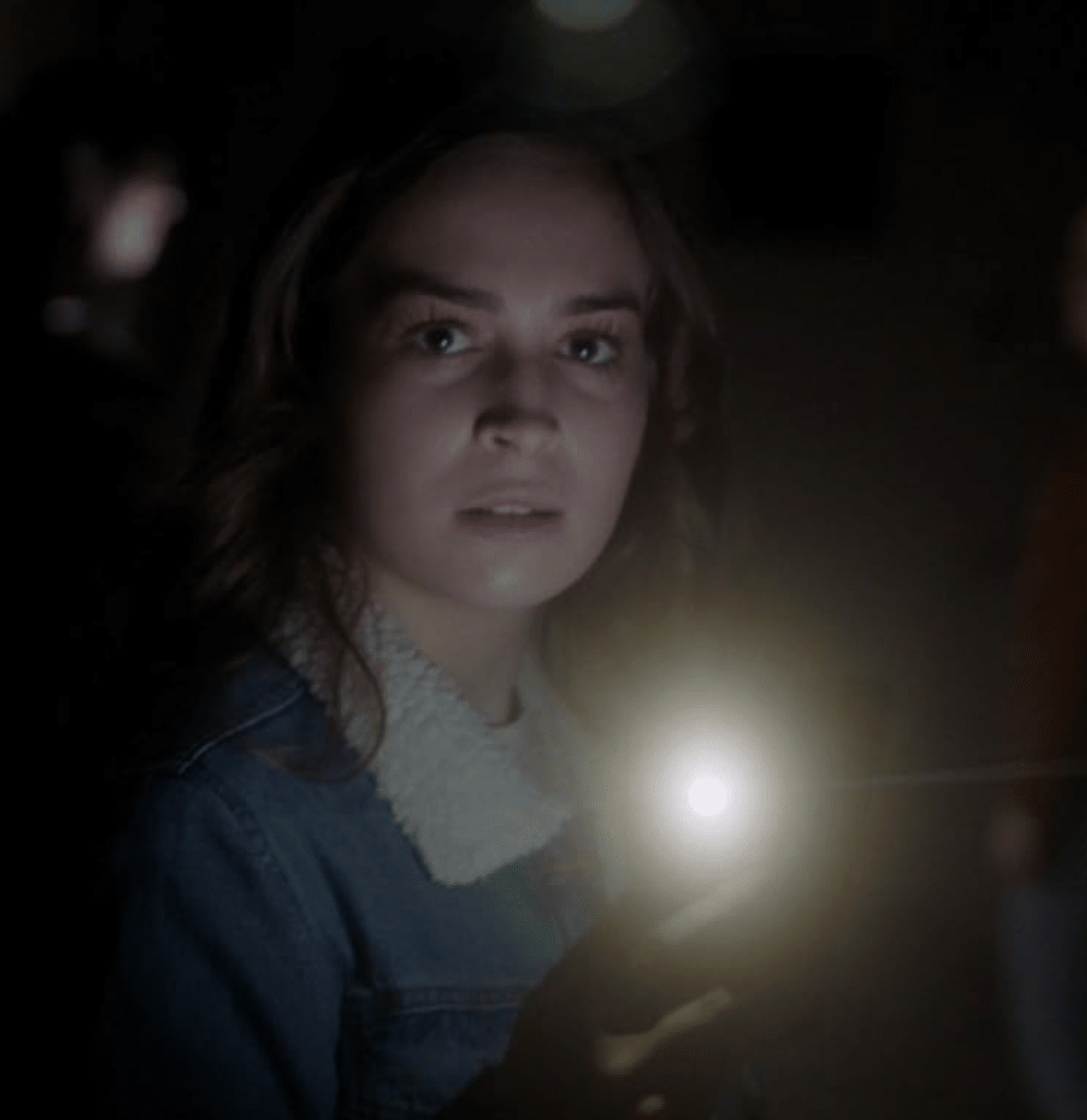
An unusual but effective blend between high-colour giallo-esque stylistics and… small town Wales, Scopophobia (2024) is a surprisingly intimate and engaging crime thriller. Thanks to those giallo elements, there’s plenty of proximity to horror too, but overall, this is a surprisingly intimate character study of a group of young women who share a nasty secret.
Milton, Wales: the early part of the film centres on a small business in this small town, Milton Steel, and its staff – one of whom is shown carrying a bright red cash box (picked out sharply for us against the rest of the film). Things get dark very quickly, even if, as remarked, the cash box doesn’t look like a lot. It’s still the difference between sink and swim for that entire month, however, so when it’s the subject of an opportunistic theft shortly after we first glimpse it, it triggers a chain of events at Milton Steel which leads to an untimely, grisly death.
Moving away from all this, at least for now, we meet a young woman named Rhiannon (Catrin Jones), receiving professional care for mental health issues – but she has the support of a small but close group of friends, and after her therapy, she is heading off with them. But the trip isn’t quite as planned: it was meant to be a night out in Cardiff, but Bethany (Sam Williams Potter) takes it upon herself to suggest they head back to Milton instead. Milton is very clearly signposted as the source of Rhiannon’s anxiety, so of course she isn’t too keen, but agrees to grin and bear it as she gets reacquainted with the rest of the girls. The meeting isn’t fully positive though; we may note a few potential sources of tension between them. Back to Rhiannon, however, and it’s obvious that this is part catch-up, part intervention: clearly all of these young women have unfinished business with the town where they grew up, and a determination to finally face it, with Rhi most in need of all.
As they descend upon a deserted local pub with courageous intent – Rhiannon pausing in this to chat with an old flame, Oliver (director and writer Aled Owen) now working behind the bar – talk turns to Milton Steel, with which Rhiannon, as it turns out, has a family connection. Whatever else is true of her, she’s harbouring knowledge which she has yet to share with the other girls, but for all of them, a late-night trip to the now deserted and derelict building is on the cards. This is more than just a trip down memory lane. They discuss something which may or may not be hidden on site, and this prompts them all to recall a period of time in their younger years when they were drawn to thrill-seeking, criminal behaviour of their own; they’re far from blameless, female victims. So they head to the building late at night, and whilst this has the potential for a showdown on its own terms given their shared history, there’s more.
After exploring the old place, the girls find out that someone has locked them in. Whoever it may be is in there with them, too, stalking the girls from room to room whilst menacingly calling out warnings. This person seems to know who they are, and maybe even what they’re doing there. But this is just the start of the girls’ reckoning with their past actions.
Criminals, or at least flawed people being confined in a small space and made to confront their deeds is a fairly popular motif in film, and whilst this first section of Scopophobia is long enough to lose some of the initial wow factor, it does establish character, with a decent, natural script and performances. There is some use of flashback, as is perhaps expected, given the ways things are panning out in the present, though unusually, the actors look plausibly school age when they are shown at that age, which is something which eludes plenty of filmmakers: it shows a good eye. The film also does an effective job of turning up various red herrings, again successfully emulating its forebears in giallo cinema: from the intro titles to the music, lighting and camera shots, it wears its heart on its sleeve in terms of its influences, and it’s a surprisingly effective blend, with a number of effective, escalatingly tense scenes.
As for the representation of Wales itself – unusual enough in a film of this type – there’s certainly some use made of very Welsh concerns. The derelict steel plant is a large feature of the Welsh cultural and physical landscape at this point, and it’s both engaging and fitting to see it used as such a key location here, newly requisitioned as a place of secrets and lies, and given some status as a setting. There’s also some interesting use made of the fact that this is such a small town, with perhaps ever-limited prospects if you have big plans (or at least plans bigger than a small town such as this can handle.) Personally, the use of modern pop music feels like a bit of a mismatch with the rest of the very effective retro soundtrack, but it’s at least understandable, and likely used as a way of bridging the gap between the very recognisable genre features and the more realist, up-to-date content. Overall, Scopophobia belies its budget to bring us an unusual and ambitious crime thriller which does more than enough to hold the interest, showcasing both a love of genre and a determination to bring a fresh approach to its storytelling. Not bad for a fifteen-day shoot. Oh, and it accounts for its unusual title, too.
